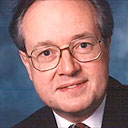
Composer Simon Bainbridge turned 50 this year, and the Proms celebrated with the BBC Singers' late-night performance of his 1999 work, Chant. Composed as part of the Sounding the Millennium series, it was originally designed for the vast spaces of York Minster. Transplanted to the equally capacious Albert Hall, the 12 amplified voices were electronically projected around the audience, creating an ethereal corona of sound.
The music is based on a medieval plainchant, Ave, Generosa, attributed to Hildegard of Bingen, and the singers are accompanied by a large ensemble, played here by the City of London Sinfonia and conducted by Stephen Cleobury. Bainbridge transforms Hildegard's chant into a cascade of chromaticism, and embellishes it with modernist clusters. Yet the whole 20-minute work is an essay in stillness. The music moves with infinite subtlety from unadulterated plainchant to electronic fantasy; as if the distant past is leaking through the pores of the present. This simultaneous sense of ancient and modern is especially powerful at the end of the piece. The singers intone the chant while the ensemble creates a static cloud of sound, with dense string chords and the constant shimmer of a triangle trill. Even in the resplendently secular Albert Hall, there was a numinous thrill in this music.
Maurice Duruflé's Requiem is another piece that uses plainchant to blur distinctions between past and present. In each movement he cloaks Gregorian chants in rich counterpoint and sumptuous orchestration. Duruflé follows Fauré's famous setting in focusing on images of consolation rather than damnation, and in Cleobury's performance, the work had an inner glow, like the luminous colours of stained glass. There were even echoes of plainchant in Walton's The Twelve, an ebullient anthem setting of a text by WH Auden. The unaccompanied soloists at the opening of the final movement declaimed austere vocal lines, before a wave of triumphalist fervour enveloped chorus and orchestra.

